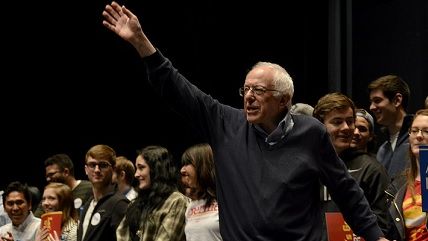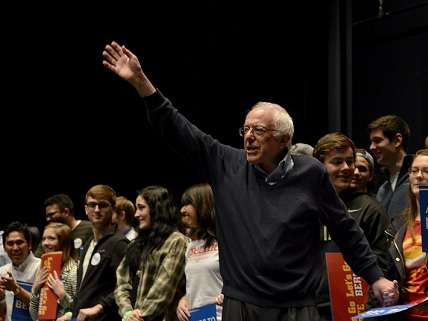Clinton Super Delegates Aggravated by Sanders Supporters Trying to Lobby Them
Website launched to target super delegates yields non-specific complaints about "threats"


Hillary Clinton has a 200+ pledged delegate lead over Bernie Sanders in the Democratic primary process. In the primaries and caucuses so far, she's received more than 2 million more votes than Sanders has, despite losing seven of the last eight contests to the Independent Senator who caucuses with Democrats.
Clinton's failure to close the door on Sanders has led to increasingly frustrated statements and behavior on both sides. Last week, Clinton suggested that she "wasn't even sure" whether Sanders was a Democrat. He's not—there's nothing there to be unsure about. In New York, she blamed Vermont for gun violence in a ridiculous argument that's misleading even by the standards of the generally misleading anti-gun rhetoric on the left.
Sanders hasn't fared much better. The Occupy Wall Street-informed "1 percent" rhetoric has taken Sanders about as far as it can take him. Last week he suggested Hillary Clinton wasn't "qualified" to be president because she took money from "Wall Street," a metonym for the entire financial and investment industry in the country. Americans employed in the financial sector have been donating money in favor of their preferred presidential candidates for a long time. Sanders and Democrats' anti-speech stance toward money in politics notwithstanding, who might support someone doesn't on its own disqualify anyone from running for office.
Given all this, more than two months into the voting phase of the Democratic primaries, the core demographic appears to be the low-information voter. The latest Idiocracy-level non-issue for Clinton and Sanders supporters to argue over is engagement of "super delegates," the 716 members of the Democratic Party who participate in the Democratic National Convention as unpledged delegates, free to vote for whomever they please. Sanders supporters, unsurprisingly, would like to see more of these super delegates support Sanders. Only 38 of the more than 500 super delegates who have verbally committed to a candidate have committed to Sanders so far, with Clinton super delegates remaining in virtually every state that Sanders has won so far. Even the governor of Vermont, a super delegate, is supporting Clinton.
One Sanders supporter set up a website, superdelegatehitlist.com, to help other Sanders supporters target super delegates and try to lobby them to support Sanders. The website's founder, Spencer Thayer, did not vote for Sanders in his home state of Illinois because there was a closed primary and Thayer is not a registered Democrat, according to the Washington Post, and described the site as "aimed at harassing Democratic super delegates" when soliciting support on Twitter to first design it.
Some Democratic super delegates, notably ones who support Clinton, are up in arms. They say the website, which has since launch changed its name to super delegatelist.com, has led to threats. But none of the super delegates the Washington Post interviewed actually reported any threat they received themselves.
Super delegate Bob Mulholland wrote a letter to Sanders complaining about his supporters contacting him and other delegates. "Society has been trying to deal with High School bullies and the same Rule should apply to your campaign and your supporters," he wrote, offering no direct evidence of any threats and saying only that other super delegates have complained about being harassed. "Professionally, campaign staff and representatives should be the ones calling delegates," he continued.
Imagine that. Party functionaries whose primary source of income is attaching themselves to the workings of government in an effort to acquire more power are upset that the hoi polloi might call back. Insofar as Democrats are responsible for wrecking cities they've had one-part control over for decades, those who lead those parties who should be hearing more from the people whose lives and communities they are ruining, not less. That they complain when animated supporters call during a presidential season betrays the kind of thin-skin people attracted to government tend to have, which accounts for a lot of the silly high-mindedness and resultant nanny state-type rules that flow from them.
One of Mulholland's complaints was that a 12-year-old (a 12-year-old!) picked up the phone when one super delegate got a phone call from a Sanders supporter. Blaming the person making a phone call not the person picking it up, and treating a 12-year-old picking up a phone as something problematic in the first place, is illustrative of the kind of mentality that's driven so much of the nanny state policies that define Democrats today.
